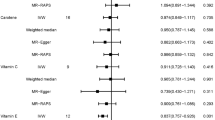We sought to determine if specific dietary antioxidants may be particularly effective in reducing breast cancer risk for women reporting family history (FH) of breast cancer in a first-degree relative. Interviews regarding usual diet, health, and family histories were conducted with 262 premenopausal and 371 postmenopausal women with incident, primary breast cancer from western New York (United States). These women were frequencymatched by age and county of residence with community controls. Among premenopausal women, there was a significant interaction between FH and α-tocopherol; α-tocopherol was associated with significantly decreased risk among FH+ women (adjusted fourth-quartile odds ratio [OR]=0.01, 95 percent confidence interval [CI]=0.0–0.3). This association was much weaker for FH-women [OR=0.7, CI=0.4–1.2]. For FH-women, a significant inverse association was observed between β-carotene and premenopausal breast-cancer risk (OR=0.4, CI=0.3–0.5), but not for FH+ women (OR=0.5, CI=0.1–4.0). Similar relationships, although not as strong, were noted among postmenopausal women. Although limited by small numbers, these results suggest that biologic mechanisms of tumorigenesis may differ in FH+ and FH-women, and that α-tocopherol may be a potential chemopreventive agent for women with a family history of breast cancer, particularly premenopausal women.
Similar content being viewed by others
References
Kelsey, JL, Gammon, MD. Epidemiology of breast cancer. Epidemiol Rev 1990; 12:228–40.
Harris, JR, Lippman, ME, Veronesi, U, Willett, WC. Breast cancer. N Engl J Med 1992; 327:319–28.
Sellers, TA, Kushi, LH, Potter, JD, et al. Effect of family history, body-fat distribution, and reproductive factors on the risk of postmenopausal breast cancer. New Engl J Med 1992;326:1323–9.
Brinton, LA, Hoover, R. Fraumeni, JFJr. Interaction of familial and hormonal risk factors for breast cancer. JNCI 1982; 69:817–22.
Sellers, TA, Potter, JD, Severson, RK, et al. Difficulty becoming pregnant and family history as interactive risk factors for postmenopausal breast cancer: the Iowa Women's Health Study. Cancer Causes Control 1993; 4:21–8.
Byrne, C, Brinton, LA, Haile, RW, Schairer, C. Heterogeneity of the effect of family history on breast cancer risk. Epidemiology 1991; 2:276–84.
Dupont, WD, Page, DL. Breast cancer risk associated with proliferative disease, age at first birth, and a family history of breast cancer. Am J Epidemiol 1987; 125:769–79.
Parazzini, F, La Vecchia, C, Negri, E, Franceschi, S, Bocciolone, L. Menstrual and reproductive factors and breast cancer in women with family history of the disease. Int J Cancer 1992; 51:677–81.
Hunter, DJ, Willett, WC. Diet, body size, and breast cancer. Epidemiol Rev 1993; 15;110–32.
Graham, S, Hellmann, R, Marshall, JR, et al. Nutritional epidemiology of postmenopausal breast cancer in western New York. Am J Epidemiol 1991; 134:552–6.
Freudenheim, JL, Marshall, JR, Graham, S, et al. Intake of vegetables/fruit and associated nutrients in the epidemiology of premenopausal breast cancer (Abstract). Am J Epidemiol 1992; 136:1001.
Marshall, J, Piore, R, Haughey, B, Rzepka, T, Graham, S. Spouse-subject interviews and the reliability of diet studies. Am J Epidemiol 1980; 112:675–83.
Byers, T, Rosenthal, R, Marshall, J, Rzepka, T, Cummings, M, Graham, S. Dietary history from the distant past: a methodological study. Nutr Cancer 1983; 5:69–77.
Bazzarre, TL, Myers, MP. The colletion of food intake data in cancer epidemiology studies. Nutr Cancer 1978; 1:22–45.
Rohan, TE, Potter, JD. Retrospective assessment of dietary intake. Am J Epidemiol 1984; 120:876–87.
US Department of Agriculture. Composition of Foods. Wshington, DC: US GPO, 1976; Agriculture Handbook 8, Revisions 8.1–8.17,8.21: 1–989.
US Department of Agriculture. Nutritive Value of American Foods in Common Units. Washington, DC: US GPO, 1975; Agriculture Handbook 456.
Paul, A, Southgate, D. The Composition of Foods. New York, NY (USA): Elsevier/North-Holland Biomedical Press, 1978.
Pennington, JAT, Church, HN. Bowes and Church's Food Values of Portions Commonly Used. New York, NY (USA): Harper and Row, 1985.
Pennington, JAT. Bowes and Church's Food Values of Portions Commonly Used. New York, NY (USA): Harper and Row, 1989.
Hall, JM, Lee, MK, Newman, B, et al. Linkage of earlyonset familial breast cancer to chromosome 17q21. Science 1990; 250:1684–9.
Claus, EB, Risch, NJ, Thompson, WD. Age at onset as an indicator of familial risk of breast cancer. Am J Epidemiol 1990; 131:961–72.
Omenn, GS. Future research directions in cancer ecogenetics. Mutat Res 1991; 247:283–91.
Friedenreich, CM, Howe, GR, Miller, AB. Recall bias in the association of micronutrient intake and breast cancer. J Clin Epidemiol 1993; 46:1009–17.
Giovannucci, E, Stampfer, MJ, Colditz, GA, et al. A comparison of prospective and retrospective assessments of diet in the study of breast cancer. Am J Epidemiol 1993; 137:502–11.
Freudenheim, JL, Johnson, NE, Wardrop, RL. Nutrient misclassification: Bias in the odds ratio and loss of power in the Mantel test for trend. Int J Epidemiol 1989; 18:232–8.
Author information
Authors and Affiliations
Additional information
This research was conducted by the Department of Social and preventive Medicine, State University of New York at Buffalo. This publication is supported in part by grants CA11535 and 5 R25 CA1820117 from the US National Cancer Institute and PDT-434 from the American Cancer Society. Dr Freudenheim is a recipient of a Research Career Development Award from the National Cancer Institute (CA01633). This work is solely the responsibility of the authors and does not necessarily represent the views of the NCI.
Rights and permissions
About this article
Cite this article
Ambrosone, C.B., Marshall, J.R., Vena, J.E. et al. Interaction of family history of breast cancer and dietary antioxidants with breast cancer risk (New York, United States). Cancer Causes Control 6, 407–415 (1995). https://doi.org/10.1007/BF00052180
Received:
Accepted:
Issue Date:
DOI: https://doi.org/10.1007/BF00052180




